Related Research Articles

Louise Glaum was an American actress. Known for her roles as a vamp in silent era motion picture dramas, she was credited with giving one of the best characterizations of a vamp in her early career.
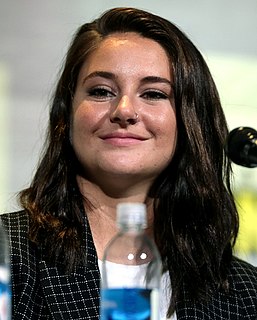
Shailene Diann Woodley is an American actress. Born in San Bernardino, California, Woodley was raised in Simi Valley, and started modeling at the age of four and began acting professionally in minor television roles. She first gained prominence for her starring role as Amy Juergens in the ABC Family drama series The Secret Life of the American Teenager (2008–2013). She subsequently made her film debut in The Descendants (2011), winning a Cannes Trophée Chopard and receiving nominations for the Golden Globe Award for Best Supporting Actress – Motion Picture and for three Critics' Choice Movie Awards. She went on to star in the coming-of-age film The Spectacular Now (2013), for which she won a special jury prize at the Sundance Film Festival.

That Midnight Kiss is a 1949 Technicolor American musical romance film also starring Mario Lanza and Kathryn Grayson. Among the supporting cast were Ethel Barrymore, conductor/pianist Jose Iturbi, Keenan Wynn, J. Carrol Naish, and Jules Munshin. The commercially popular film was directed by Norman Taurog, who the following year would again direct Lanza and Grayson in the even more successful The Toast of New Orleans.

Tsuru Aoki was a Japanese stage and screen actress whose career was most prolific in the United States during the silent film era of the 1910s through the 1920s. Aoki may have been the first Asian actress to garner top billing in American motion pictures.
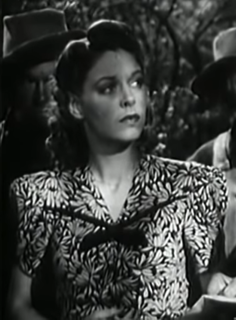
Anne Nagel was an American actress. She played in adventures, mysteries, and comedies for 25 years. She also appeared in television series in the 1950s. One book described her as "one of Hollywood's true hard-luck gals".
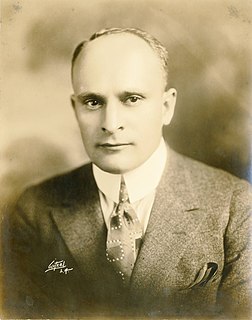
Charles Gardner Sullivan was an American screenwriter and film producer. He was a prolific writer with more than 350 films among his credits. In 1924, the magazine Story World selected him on a list of the ten individuals who had contributed the most to the advancement of the motion picture industry from its inception forward. Four of Sullivan's films, The Italian (1915), Civilization (1916), Hell's Hinges (1916), and All Quiet on the Western Front (1930), have been listed in the National Film Registry.

Sex is a 1920 American silent drama film directed by Fred Niblo, written by C. Gardner Sullivan, produced by J. Parker Read, and starring Louise Glaum. On its surface, the film was a morality story on the evils of marital infidelity. However, the film's producer, J. Parker Read, had made a series of pictures on sex themes. The release of Sex, with its provocative title and explicit scenes of seduction and debauchery, made it the subject of controversy among censors and commentators.
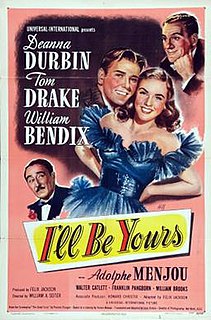
I'll Be Yours is a 1947 American musical comedy film directed by William A. Seiter and starring Deanna Durbin. Based on the play A jó tündér by Ferenc Molnár, the film is about a small-town girl who tells a fib to a wealthy businessman, which then creates complications. The play had earlier been adapted for the 1935 film The Good Fairy by Preston Sturges.

The Aryan is a 1916 American silent Western film starring William S. Hart, Gertrude Claire, Charles K. French, Louise Glaum, and Bessie Love.
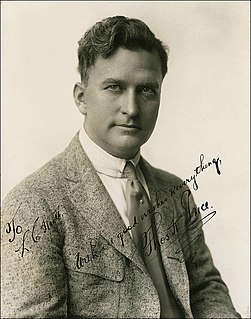
Thomas Harper Ince was an American silent film - era filmmaker and media proprietor. Ince was known as the "Father of the Western" and was responsible for making over 800 films. He revolutionized the motion picture industry by creating the first major Hollywood studio facility and invented movie production by introducing the "assembly line" system of filmmaking. He was the first mogul to build his own film studio dubbed "Inceville" in Palisades Highlands. Ince was also instrumental in developing the role of the producer in motion pictures. Three of his films, The Italian (1915), for which he wrote the screenplay, Hell's Hinges (1916) and Civilization (1916), which he directed, were selected for preservation by the National Film Registry. He later entered into a partnership with D. W. Griffith and Mack Sennett to form the Triangle Motion Picture Company, whose studios are the present-day site of Sony Pictures. He then built a new studio about a mile from Triangle, which is now the site of Culver Studios. Ince's untimely death at the height of his career, after he became severely ill aboard the private yacht of media tycoon William Randolph Hearst, has caused much speculation, although the official cause of his death was heart failure.

Sahara is a 1919 American dramatic film written by C. Gardner Sullivan and directed by Arthur Rosson. The film starred Louise Glaum and told a story of love and betrayal in the Egyptian desert.

Clara Williams was an American silent film actress. Along with Louise Glaum and Dorothy Dalton, she was one of the principal leading ladies at Inceville, one of the first motion picture studios to make feature films in Los Angeles. Williams appeared in more than one hundred films between 1910 and 1918, including starring roles in The Italian and William S. Hart's western, Hell's Hinges, both of which are included in the National Film Registry. When she married director Reginald Barker at age 31, she retired from acting.

Raymond B. West was an American motion picture director. He joined the New York Motion Picture Company in 1910 and directed more than 70 motion pictures between 1910 and 1919 before being involved in an equestrian accident on set that resulted in permanent physical and psychological damage, forcing his retirement. He died in 1923 at age 37 from complications arising from his prior accident.

The Lone Wolf's Daughter is a surviving 1919 American silent era crime/drama/thriller motion picture starring Bertram Grassby, Louise Glaum, and Thomas Holding.

The Leopard Woman is a 1920 American silent adventure romance drama film starring Louise Glaum, House Peters, and Noble Johnson. Directed by Wesley Ruggles and produced by J. Parker Read, Jr., the screenplay was adapted by H. Tipton Steck and Stanley C. Morse based on the novel The Leopard Woman (1916) by Stewart Edward White.

Fifty-Fifty is a 1925 American silent drama film starring Hope Hampton, Lionel Barrymore, and Louise Glaum. Directed and produced by Henri Diamant-Berger for the production company Encore Pictures, Fifty-Fifty is a remake of a 1916 Norma Talmadge film also titled Fifty-fifty that was directed by Allan Dwan, who wrote the original story.

Somewhere in France is a 1916 silent era war espionage drama motion picture starring Louise Glaum and Howard C. Hickman.

A Strange Transgressor is a 1917 silent drama film starring Louise Glaum, J. Barney Sherry, and Colin Chase.

Love is an extant American 1920 silent era romance drama film starring Louise Glaum, James Kirkwood, and Joseph Kilgour. Directed by Wesley Ruggles and produced by J. Parker Read, Jr., the screenplay was adapted by Louis Joseph Vance based on a story by Carol Kapleau.

Golden Rule Kate is a 1917 American silent Western film starring Louise Glaum, William Conklin, Jack Richardson, Mildred Harris, and John Gilbert. It was directed by Reginald Barker from a story written by Monte M. Katterjohn and produced and distributed by the Triangle Film Corporation.